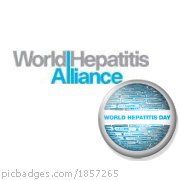
Last Thursday, May 12th, I attended the Congressional Briefing, and the Press Conference releasing the U.S. Department of Health and Human Services (HHS) Action Plan to Prevent, Care and Treat Viral Hepatitis, in Washington D.C.. The HHS Action Plan is in response to the 2010 Institute of Medicine (IOM) report on viral hepatitis.
I have been involved with viral hepatitis, specifically hepatitis B, from a patient perspective for over a decade, but my recent involvement in the political arena is new. So, I’m still struggling with the numerous acronyms, political calendars and jargon…
It was encouraging to see members of Congress in attendance at the Congressional Briefing – hosted by U.S. Senator John Kerry (D-MA) and Rep. Mike Honda (D-CA), but it is clear that viral hepatitis needs more champions in Congress. Congressional leaders who spoke included Rep. Honda (D-CA) , Rep. Cassidy (R-LA), Rep. Judy Chu (D-CA), Rep. Dr. Christensen (D-VI), Rep. Barbara Lee (D-CA), and Rep. Dent (R-PA). Federal public health leaders Dr. Howard Koh, Assistant Secretary of Health, and Dr. Kevin Fenton, Director, National Center for HIV/AIDS, Viral Hepatitis, STD and TB Prevention of the CDC spoke regarding the direction and implementation of the plan.
Congressman Honda’s message was loud and clear to the audience: “You need to be the megaphone.” As advocates we need to educate and get our representatives on-board. The other, clear message is that the plan is a strategy with the tactics not yet clearly defined. More importantly, there is no clear funding dedicated to the roll-out. Rep. Bill Cassidy, a hepatologist, tells us we must be “fiscally responsible”, and yet he also said “Sometimes you have to increase the budget to reduce the deficit”. Rep. Donna Christensen, also a doctor, states: “We can save money and reduce the debt” with the viral hepatitis plan. As a hepatologist and physician, these representatives understand that money spent on patient education, screening, prevention and treatment will be cost effective over time. I wonder how many Representatives truly understand the ticking time bomb of this silent epidemic.
The representation at the press conference in D.C. was encouraging –everyone in the room with the same goals. Dr. Susan Wang, a doctor in NYC spoke of her patient base where one in eight patients are infected with HBV. Michael Ninburg told his personal story with his fight with hepatitis C, and the successful prevention of HBV from his chronically infected wife to their newborn son. Michael was cured with the new HCV drugs, and his son was protected by a safe vaccine. All good.
The HHS Action Plan for Viral Hepatitis will roll out through 2013. Some of the goals are more attainable than others, such as delivering the first birth dose of the HBV vaccine to infants prior to discharge. Dr. Koh describes this as the “first shot of life.” Administering prophylaxis and vaccination to infants born to HBV infected mothers is also feasible. Other goals are loftier, less clearly defined, and will require significant funding.
Dr. Fenton, of the CDC, tells us the viral hepatitis plan will be implemented as a collaborative effort, leveraging resources between government agencies such as HHS, HRSA (Health Resources and Services Adminstration , CDC (Centers for Disease Control), and CMS (Centers for Medicare and Medicaid Services).
Portions of the plan are dependent on the Affordable Care Act (ACA) and Health Care Reform, which are under attack. It will be important for these programs remain intact for the plan to be successful.
We are all well aware of shrinking budgets and the need to be fiscally responsible, keeping in mind the human component. This plan cannot be implemented without collaboration and cooperation between government and community organizations and efforts, and most importantly – funding.
That’s where we, as voting Americans, fit into the equation. We need to get educate our Representatives and Senators by raising their awareness of viral hepatitis. We need to tell them there is a plan to combat viral hepatitis. We need to personalize this, tell our stories, and let them know that we do NOT want funding for viral hepatitis cut from the budget.
Was your Representative present at the briefing? Mine was not…
Visit your Representative during Constituent Work Week. Write a letter, send an email, call and speak to a health staffer, or tweet your Representative, today.
Read the HHS Action Plan to Prevent and Treat Viral Hepatitis.
 World Hepatitis Day is Thursday, July 28th! Join the World Hepatitis Alliance. The theme is “This is Hepatitis”, which is aimed at raising global awareness. Globally, two billion people have been infected with hepatitis B, (one out of three), and 400 million live with a chronic, lifelong infection. Although there are excellent treatments available, there is no cure for hepatitis B. However, there is a safe and effective HBV vaccine. If you are infected, be sure loved ones and household contacts are screened and vaccinated. If you are not infected or not vaccinated, get vaccinated and help eliminate the spread of this virus, worldwide.
World Hepatitis Day is Thursday, July 28th! Join the World Hepatitis Alliance. The theme is “This is Hepatitis”, which is aimed at raising global awareness. Globally, two billion people have been infected with hepatitis B, (one out of three), and 400 million live with a chronic, lifelong infection. Although there are excellent treatments available, there is no cure for hepatitis B. However, there is a safe and effective HBV vaccine. If you are infected, be sure loved ones and household contacts are screened and vaccinated. If you are not infected or not vaccinated, get vaccinated and help eliminate the spread of this virus, worldwide.







